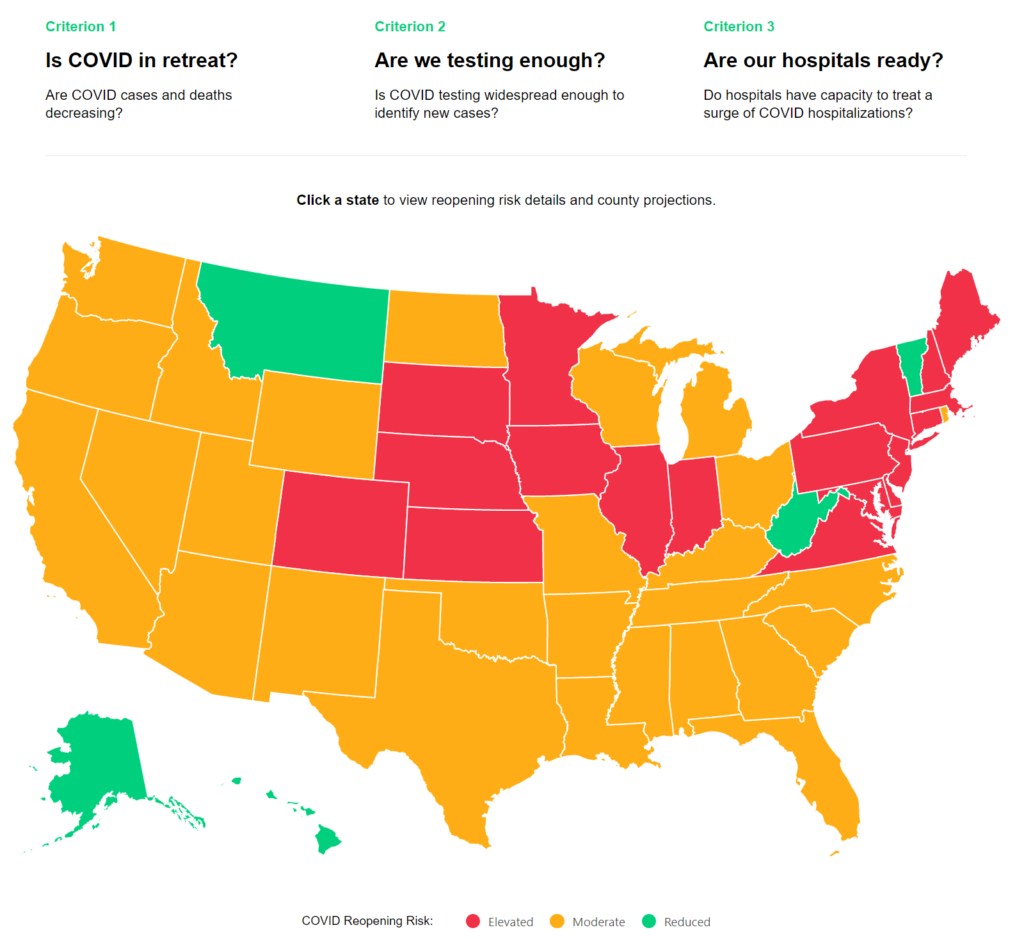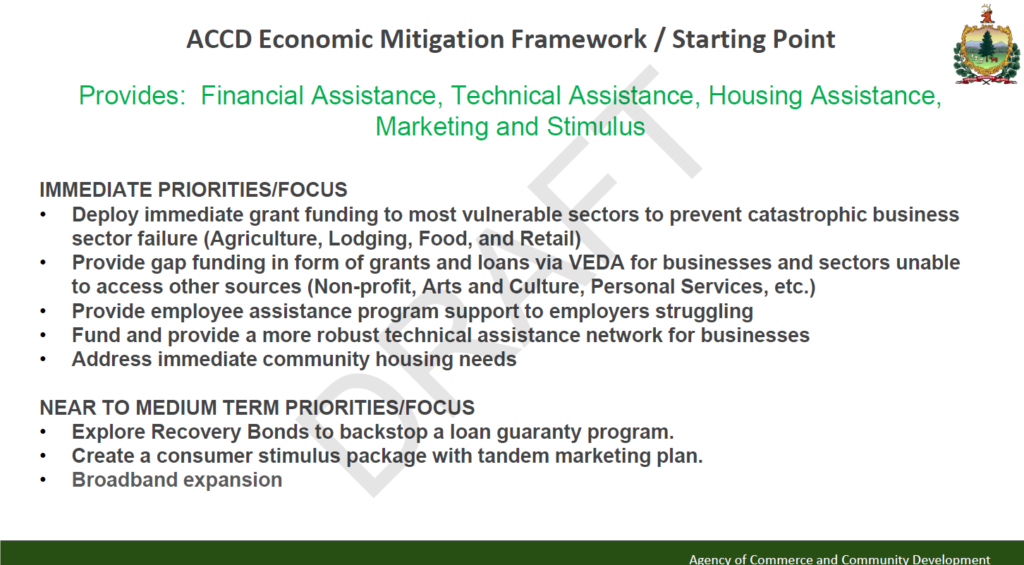This week’s Legislative Update is sponsored by:
May 15, 2020
The Governor today extended the “Stay Home, Stay Safe” Order set to expire. The order has been amended this week to ease some restrictions allowing the State to continue slowly reopening in a measured way that can ensure our healthcare system will not find itself overwhelmed with COVID-19 patients. Vermonters continue to be supportive and compliant with policies and practices to curtail the virus.
COVID Act Now, is a program in partnership with the Georgetown University Center for Global Health Science and Security, Stanford University Clinical Excellence Research Center, and Grand Rounds. They measure the safety of reopening along three criteria: are COVID cases and deaths decreasing? Is testing widespread enough to identify new cases? Do hospitals have capacity to treat a surge of COVID hospitalizations? According to that criteria, they rate Vermont as one of the few states that can safely reopen, precisely because we’ve been so cautious and will continue to be.

In this week’s update:
- “Stay Home, Stay Safe” order extended
- LCRCC webinars to help you navigate our new era
- Work underway to reopen childcare centers
- Supplemental budget agreed on, work on “skinny” FY 21 budget begins
- New federal legislation introduced; a long way from agreed upon
- Vermont legislature begins work again on non-COVID legislation
- LCRCC testifies on tourism and hospitality concerns
- Hazard pay bill slows down in House
- The Laundry List
Executive Order Gets Extended, Eased
Today the Governor extended the state of emergency until June 15 and relaxed the “Stay Home, Stay Safe” order, adopting a “Be Smart, Stay Safe” order. The Governor emphasized the need to stay close to home and limit contact with others, especially for those over age 65 or with health issues. Overall the order maintains restrictions already in place. The Governor strongly recommends masks, however, he will not mandate them, though municipalities may require them if they see a need. LCRCC has requested clarification from the Administration for guidance on liability issues around requiring customers to wear masks which we will share when available.
The Governor also indicated that if health data continues to move in the right direction, close contact businesses, professional services, and outdoor dining at restaurants could be reopened between now and June 1.
Additional guidance and loosened restrictions came earlier this week. ACCD has released updated guidance for non-essential retail and drive-in operations that go into effect May 18, 2020 and includes reopening retail operations in a limited capacity with mandatory health and safety requirements. The Agency has provided new signage for retailers to post.
ACCD has released additional guidance for lodging reservations between May 15 and June 15, 2020 at hotels, motels, bed and breakfasts, inns, short term rentals, and all public and private camping facilities and RV parks. All lodging properties must remain closed per existing orders (including the relevant exemptions) and should cancel reservations between May 15, 2020 and May 22, 2020. All reservations from out-of-state guests who cannot first meet the mandatory 14-day quarantine requirements must also be canceled through June 15, 2020.
Lodging establishments are limited to a 25% occupancy rate. If a lodging establishment is already hosting essential workers or long-term guests, the 25% capacity will be assessed outside of the capacity used by that guest. Similar guidance applies to campgrounds and marinas who have seasonal guests. Lodging establishments will need to maintain a guest log for 30-days. Other additional policies will be shared as they come on housekeeping and guest check-ins are coming shortly.
LCRCC Webinars to Help You Navigate
LCRCC has three webinars which you should strongly consider attending or watching soon.
The first webinar, “Adapting Vermont Hospitality to COVID-19,” will take place on Thursday, May 21 from 9:00-10:30 AM. Local business owners will contribute to a panel discussion on how the hospitality industry can advocate for assistance and adapt to our new normal while generating business and revenue. This webinar is free but registration is capped at 90, so please register in advance here.
The second webinar, “An Overview of FFCRA with Sheehey Furlong & Behm,” will take place on Tuesday, May 26 from 9:00-10:30 AM. The Lake Champlain Chamber and special guests Sheehey Furlong & Behm will provide an overview of the Families First Coronavirus Response Act (FFCRA) and its interaction with other state and federal programs. This webinar is free but registration is capped at 90, so please register in advance here.
The Lake Champlain Chamber also hosted a “Strategies for Returning to Work” webinar with DRM earlier this month that focused on helping businesses think through the process of returning to work amidst the COVID-19 crisis. The recording of this webinar can be found here.
Always feel free to share with us what webinar topics would be valuable to you.
The Work to Open Childcare Providers Begins
This week the Department of Health issued health guidance for child care, after school, and summer camp providers. The guidelines for the $6 million in childcare restart grants should be made available today. Childcare providers will be expected to submit intent to access the funds which can be used to cover payroll, supplies, and other needs, by next Friday. Childcare providers are not mandated to open, however, they now have resources available and restrictions loosened to allow them to operate as of June 1. 30% of the childcare providers stayed open through this state of emergency to serve the needs of essential workers and it is unclear how many of the 70% that closed their doors will reopen under the new restrictions.
Supplemental Budget Agreed, Work on “Skinny Budget” Begins
Today the House passed the state’s Supplemental Budget Adjustment Act covering the remainder of the fiscal year. The bill addressed three areas of adjustment: an erosion of $52M in projected revenue; $143M in deferred tax collection creating a cash flow issue in the year’s fiscal budget; and the beginning of the use of $200 million of the $1.25 billion allocated to the state from the CARES Act.
More about the Supplemental Budget Adjustment here.
Work began immediately on the “skinny budget” which will cover the first three months of FY 21.
This is the more difficult budget as this is where the state will face the serious revenue shortfalls created by the pandemic. The $1 billion left of Coronavirus Relief Fund money to be carved up in the FY 21 budget cannot, pending congressional action, be used for revenue replacement.
Already this week, the difficulty of budgeting for FY 21 was on full display. The Agency of Administration shared with the legislature that they’ve requested agency heads to identify 23% in cuts for the “skinny budget” — the equivalent of an annualized 8% cut. On Thursday, a suggestion by the administration that towns might re-vote on school budgets given the revenue shortfalls to the education fund was greeted with a cold reception by a Joint Committee Meeting of money and education committee members. The Agency of Commerce and Community Development this week told the legislature that they estimate that they will need 30% of the $1.25 billion in CARES Act money to keep the hardest hit Vermont businesses in hospitality, retail, and food from going under.

New Federal Legislation Introduced; Long Way from Agreed Upon
On Tuesday Congressional Democrats rolled out their aspirational next round of federal COVID-19 relief called the HEROES Act.
The $3 trillion dollar bill envisions:
$900 billion for state and local governments with $187 billion for municipalities through modified Community Development Block Grants and $500 billion for states
Loosening the restrictions on CARES Act Coronaviris Relief Fund dollars to allow states to offset “lost, delayed, or decreased revenue stemming from the COVID public health emergency.”
$200 billion in hazard pay for essential and frontline workers
$10 billion expansion of the food stamps program
$175 billion in housing assistance for renters and homeowners
$75 billion for public health measures like testing and contact tracing
Another round of stimulus checks for households
Changes to Paycheck Protection Program to allow more flexibility
Extends the federal Pandemic Unemployment Compensation benefit, the extra $600 on top of the state maximum, through January.
A rollback of the 2017 $10,000 cap on the deduction of state and local taxes (SALT)
It looks as though the best-case scenario for the bill would be the passage in mid-June and the Senate Republicans do not find the bill friendly for a number of reasons. Many items in this package are long-standing Democratic priorities, such as the SALT rollback, and a feeling among Republicans that additional funding to states is a “blue state bailout.”
The Paycheck Protection Program (PPP) has come under increased scrutiny and been the subject of many requests for revisions. Last week, Attorney General Donovan joined a coalition of 24 attorneys general in calling for key changes to the PPP to ensure that funds are distributed fairly and equitably. The week before, Vermont’s Congressional Delegation sent a letter to the Treasury asking for much greater flexibility. This week, the Small Business Association released a flash report ahead of an Inspector General review as well as an independent audit. The PPP has surprisingly more funds left at this time than was expected, leading many to believe that businesses have become skittish of the program.
Unemployment Update
Yesterday the Department of Labor notified Pandemic Unemployment Assistance (assistance for business owners) recipients that if they received benefits for the weeks of March 15 and/or March 22 and had filed those claims prior to May 1, that their benefits included the extra federal $600 in error. The federal $600 benefit did not go into effect until the benefit week of March 29.
This error required the Department to stop issuing benefits until the system’s payment calculation process was corrected and payments were reconciled. Benefits for the week of April 26 and/or May 3 will be offset to ensure accurate benefit amounts to claimants. In most cases, this will mean one whole benefit week will be withheld and the second week will be a partial payment. If you only filed and received benefits for March 22, then only $600 will be offset.
At the beginning of the week, the Department of Labor announced that 9,000 claimants who were unable to receive traditional UI were transferred over to the PUA program.
Vermont experienced its highest level of claims three weeks ago with over 80,000 claims putting the state unemployment rate at 23.8%. This week, weekly unemployment claims continued to fall for the third straight week with totally new and continuing claims at 59,953 for an unofficial rate of about 17%. Vermont has $455.3 million in its trust fund, more than double the amount the Trust Fund had when the economy started to slide in 2007, so the fund is not expected to fall into deficit under these conditions. However, the total impact of the economic crisis is unknown, with many businesses shuttering their doors or cutting staff.
Finally, this week, reimbursable employers, who do not pay into the UI Trust Fund and instead pay out claims, started to see increases in their required payments. If you have experienced this, please reach out to our advocacy team at [email protected]. Under the CARES Act, the federal government will pay 50% of the reimbursable unemployment benefits from March 13, 2020 through December 31, 2020 for those non-profit employers that use the reimbursement method for paying unemployment benefits and allows states flexibility in collecting the remaining 50%.
Vermont Legislature Gets Back to Non-COVID Legislation
On Thursday the Senate passed two non-COVID related bills that had been ordered to lie. S.337, the “Energy Efficiency Modernization Act” establishes a pilot for efficiency utilities to work in the thermal and transportation sectors using up to $2 million per year from the energy efficiency charge. Also passed was S.185, which requires the Department of Health to develop and adopt a statewide climate change response plan to make sure residents will still be able to access health care.
In the House, the Committee on Natural Resources, Fish, and Wildlife took up for consideration S.227, which would look to extend the work of the single-use, plastic products working group by creating requirements for extended product responsibility, and among other things would prohibit lodging establishments from furnishing guests with toiletry bottles under six ounces, which ironically would include hand sanitizer.
These bills moving forward create difficulty for those advocates, such as LCRCC, who are focusing the bulk of their effort on the much more critical work of helping the Vermont community recover.
LCRCC Testifies Around Tourism, Hospitality, and Lodging Concerns
Today, LCRCC’s Government Affairs Manager and Vice President of Tourism and Marketing testified in the Senate Committee on Economic Development, Housing, and General Affairs about the difficulties faced by every business that depends on tourism, either directly or indirectly from downstream spending.
LCRCC walked the committee through the memos sent last week to the Administration and Joint Fiscal Committee requesting the formation of a grant program to help this sector; guidance and funds for municipalities to facilitate more outdoor dining and retail; and a $1 million appropriation for marketing the state to the over 80 million potential visitors within a day’s drive of the state. The Committee seems to be willing to allocate $300 million in CARES funds to the Agency of Commerce and Community Development to allocate grants similar to those described in our memo last week as well as loans similar to Economic Injury Disaster Loans tailored more towards Vermont businesses.
LCRCC will be hosting a webinar on Thursday, May 21, aimed at helping hospitality businesses pivot and adapt to new circumstances. You can register here.
Hazard Pay Bill Slows Down
S.346, the COVID-19 Essential Employees Hazard Grant Program, aimed at rectifying the disparity between the wages many workers are making at their job and what they would be receiving on unemployment is facing more skepticism since it passed the Senate. The administration was unsure that $60 million required for the bill could be paid out of the $1.25 billion dollars allocated under the CARES Act despite the last-minute changes by the Senate to include language more in-line with the regulations placed on the funds. This week that seemed to be the prevailing opinion as work on the bill continued in the House Committee on Commerce and Economic Development.
The Laundry List
- Governor Scott signed S.333, an act relating to establishing a moratorium on ejectment and foreclosure actions during the COVID-19 emergency on Thursday.
- ACCD still wants to hear from all Vermont businesses impacted by the response to the COVID-19 virus. Please share these impacts via the ACCD Business Impact Form, which will help us assess the full impact as we work toward solutions.
- The Community Engagement Lab is offering a series of forums for artists, instructors, and arts organizations to explore how arts organizations can reestablish themselves in and after the pandemic. The forums will be open to the public and will feature panels of artists and arts leaders in dialogue about the challenges and opportunities facing the arts field.
Concerned or need to learn more about anything in this newsletter? Email our team at [email protected].
We look forward to working with you this session.
Sincerely,
The Lake Champlain Chamber Advocacy Team



